159 books about Faith and 5
start with E
159 books about Faith and 5
159 books about Faith
5 start with E start with E
5 start with E start with E
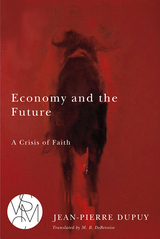
Economy and the Future
A Crisis of Faith
Jean-Pierre Dupuy
Michigan State University Press, 2014
A monster stalks the earth—a sluggish, craven, dumb beast that takes fright at the slightest noise and starts at the sight of its own shadow. This monster is the market. The shadow it fears is cast by a light that comes from the future: the Keynesian crisis of expectations. It is this same light that causes the world’s leaders to tremble before the beast. They tremble, Jean-Pierre Dupuy says, because they have lost faith in the future. What Dupuy calls Economy has degenerated today into a mad spectacle of unrestrained consumption and speculation. But in its positive form—a truly political economy in which politics, not economics, is predominant—Economy creates not only a sense of trust and confidence but also a belief in the open-endedness of the future without which capitalism cannot function. In this devastating and counterintuitive indictment of the hegemonic pretensions of neoclassical economic theory, Dupuy argues that the immutable and eternal decision of God has been replaced with the unpredictable and capricious judgment of the crowd. The future of mankind will therefore depend on whether it can see through the blindness of orthodox economic thinking.
[more]
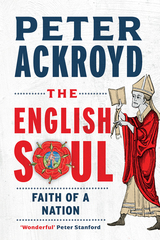
The English Soul
Faith of a Nation
Peter Ackroyd
Reaktion Books
From celebrated historian and writer Peter Ackroyd, a magisterial portrayal of English Christianity over the centuries.
This book portrays the spirit and nature of English Christianity, as it has developed over the last fourteen hundred years. During this time, Christianity has been the predominant faith of the people and the reflection of the English soul. This fascinating new history is an account of the Christian English soul, which recognizes the fact that Christianity has been the anchoring and defining doctrine of England while accepting respectfully that other powerful and significant faiths have influenced the religious sensibility of this nation. Peter Ackroyd surveys the lives and faith of the most important figures of English Christianity from the Venerable Bede to C. S. Lewis, exploring the mysticism of Julian of Norwich and William Blake; the tumultuous years of the Reformation; the emergence of the English bible; the evangelical tradition, including John Wesley; and the contemporary contest between tradition, revival, and atheism. This is an essential, comprehensive, and accessible survey of English Christianity.
This book portrays the spirit and nature of English Christianity, as it has developed over the last fourteen hundred years. During this time, Christianity has been the predominant faith of the people and the reflection of the English soul. This fascinating new history is an account of the Christian English soul, which recognizes the fact that Christianity has been the anchoring and defining doctrine of England while accepting respectfully that other powerful and significant faiths have influenced the religious sensibility of this nation. Peter Ackroyd surveys the lives and faith of the most important figures of English Christianity from the Venerable Bede to C. S. Lewis, exploring the mysticism of Julian of Norwich and William Blake; the tumultuous years of the Reformation; the emergence of the English bible; the evangelical tradition, including John Wesley; and the contemporary contest between tradition, revival, and atheism. This is an essential, comprehensive, and accessible survey of English Christianity.
[more]
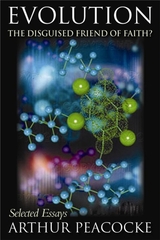
Evolution
The Disguised Friend of Faith?
Arthur Peacocke
Templeton Press, 2004
Arthur Peacocke, eminent priest-scientist, has collected thirteen of his essays for this volume. Previously published in various academic journals and edited books, the provocative essays expand upon the theme of the evolution of nature, humanity, and belief. They are grouped into three parts:
- Natural Evolution covers topics ranging from the implications of deterministic chaos; biological evolution and Christian theology; chance, potentiality, and God; complexity, emergence, and divine creativity.
- Humanity Evolving in the Presence of God, articulating God’s presence in and to the world as it is unveiled by the sciences; the chrysalis of the human; the nature and purpose of man in science and Christian theology.
- Theological Evolution—the Reshaping of Belief, dealing with science and the future of theology; public truth in religion; the incarnation of the self-expressive word of God; DNA; and the challenges and possibilities of western theism.
In the epilogue, Dr. Peacocke discusses wisdom in science and education, referring to Robert Grosseteste, a medieval scientist-theologian.
[more]
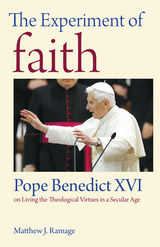
The Experiment of Faith
Pope Benedict XVI on Living the Theological Virtues in a Secular Age
Ramage
Catholic University of America Press, 2020
Pope Benedict XVI memorably remarked that the Christian faith is a lot like a Gothic cathedral with its stained-glass windows. From the outside, the Church can appear dark, dreary, and worn with age—the crumbling relic of an institution that no longer speaks to men and women living in our modern world. Indeed, for many people today, Christian morality with all of its commandments appears to be a source not of life and joy but instead of suffering and oppression. Even within the Church, many wonder: why should I submit to ancient doctrines and outdated practices that restrict my freedom and impede my happiness?
In this timely and original book, his third exploring the riches of Benedict XVI’s vast corpus, theologian Matthew Ramage sets out to meet this challenge with an in-depth study of the emeritus pontiff’s wisdom on how to live Christian discipleship in today’s increasingly secularized world. Taking as his starting point Benedict’s conviction that the truth of Christianity—like the beauty of a cathedral’s glorious windows—can be grasped only from the inside, Ramage draws on Benedict’s insights to show how all Christians can make the “experiment of faith” by living the theological virtues of faith, hope, and charity in daily life. Along the way, he shares his personal reflections on how Benedict’s wisdom has helped him to navigate difficulties in embracing the faith and provides a way forward to those struggling to live as disciples in a way that is intellectually serious without remaining merely intellectual. In so doing, he also presents a highly nuanced yet accessible approach to defending the truth of the gospel in a world where life in Jesus Christ tends to be seen as unfulfilling, irrelevant, or just one lifestyle choice among others.
[more]
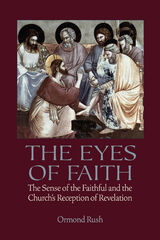
The Eyes of Faith
The Sense of the Faithful and the Church's Reception of Revelation
Ormond Rush
Catholic University of America Press, 2009
The Eyes of Faith presents a systematic theology of the sense of the faithful (sensus fidelium) and shows the fundamental and necessary interrelationship between sensus fidelium, tradition, Scripture, theology, and the magisterium.
[more]
READERS
Browse our collection.
PUBLISHERS
See BiblioVault's publisher services.
STUDENT SERVICES
Files for college accessibility offices.
UChicago Accessibility Resources
home | accessibility | search | about | contact us
BiblioVault ® 2001 - 2024
The University of Chicago Press









